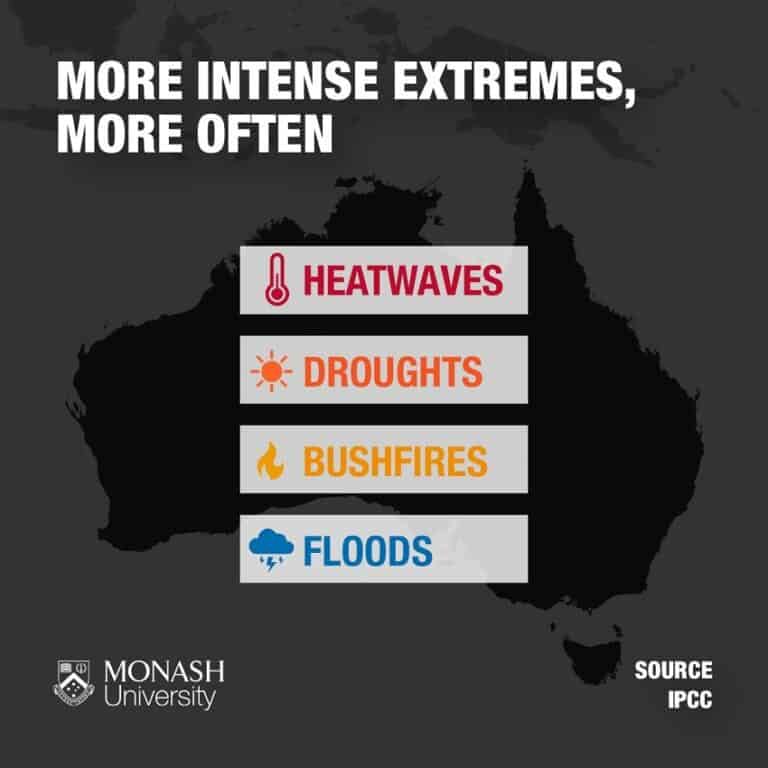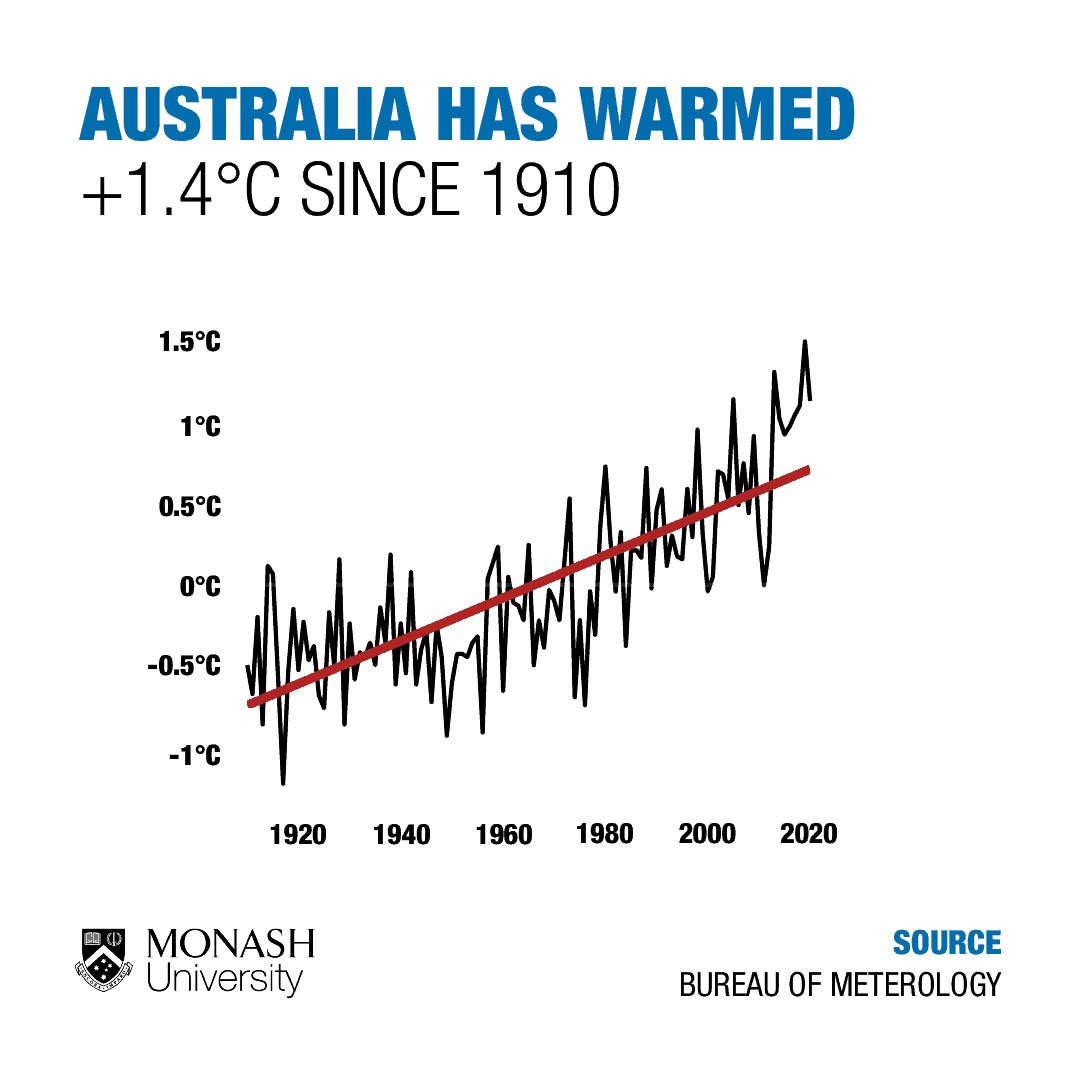Brought to you by The Echo and Cosmos Magazine
IPCC releases sixth major assessment report, and it’s clear that the biggest threat now is delay.

As fires and floods rage across the globe, the Intergovernmental Panel on Climate Change (IPCC) has released its latest major assessment report on the climate. The results are clear – without a shadow of a doubt, human influence has warmed the atmosphere, ocean and land.
This is not a surprise.
The report synthesises more than 14,000 scientific papers to provide the most up-to-date view of how the changing climate has affected, and will affect, the world. It found that many of the observed changes are beyond anything experienced for thousands of years – if not hundreds of thousands – and may continue to influence the Earth’s systems for millennia to come.
This, too, is not a surprise.
The report says we need to immediately slash greenhouse-gas emissions and rapidly reduce our reliance on fossil fuels in order to avoid the worst-case scenarios of extreme weather, sea-level rise and more.
This, yet again, is not a surprise.
We have known all this for 30 years.
IPCC Working Group I Report Fast Facts
- The report was compiled by 234 scientists from around the world.
- It is part of the sixth iteration of IPCC assessments, with the last one released in 2014.
- This is just the first section, addressing how we have advanced in our scientific knowledge of the physical basis of climate change.
- Subsequent reports released over the coming months will address how these findings can be translated into policy and action.
Let’s take a step back and look at the bigger picture.
In 1990, the IPCC published its First Assessment Report. It has since released a series of further reports, drawing on the expertise of hundreds of international researchers to synthesise our knowledge of the science of climate change, its impacts and the actions we need to take.
Even in the first report, the evidence showed that ‘human activities are substantially increasing the atmospheric concentrations of the greenhouse gases: CO2, methane, CFCs and nitrous oxide”.
This spurred the establishment of the international environmental treaty, the United Nations Framework Convention on Climate Change (UNFCCC), in 1992, with the goal of avoiding ‘dangerous human interference with the climate system”. This agreement was signed by all industrialised nations.
But in the three decades since, ‘we have emitted one trillion tonnes of carbon dioxide coming from the combustion of fossil fuels and land-use change”, says the CSIRO’s Pep Canadell, who was coordinating lead author on chapter five of the new report.
‘That is 41 per cent of all CO2 emissions emitted since the beginning of the Industrial Revolution – 41 per cent in the last 30 years.”
So in 1990, scientists were already issuing warnings about the need to urgently reduce our emissions. We then not only continued to burn fossil fuels, but almost doubled our emissions compared to the dawn of the industrial era.
In the subsequent years, the science has solidified as the IPCC released report after report, each one acting as a pillar in our understanding of climate change.
This new, sixth assessment weaves in eight more years of data about the physical underpinnings.
Lead author of one report chapter, Michael Grose from CSIRO, highlights ‘the sheer weight and bulk of evidence presented in the report’.
‘There’s more evidence than ever – there’s more sophistication in that evidence than ever,’ he says.‘Just the sheer number of scientific papers that are reviewed and assessed, and the number of hours worked on it – it was immense.’

Blair Trewin, climate scientist from the Australian Bureau of Meteorology and lead author on chapter two of the report, says the data sets used have a more global coverage than previous data.
So what do the findings actually tell us?
‘We can see that the climate system is in a state that it has not been for at least centuries to millennia, and changing at a rate that is unprecedented in at least the last 2,000 years,’ Trewin says.
‘We’re really seeing conditions that are outside the range of human experience.’
Ice-core records have confirmed that the concentrations of the main greenhouse gases – carbon dioxide, methane, nitrous oxide – are higher than at any point in the last 800,000 years. For context: our species, Homo sapiens, only arose 200,000 years ago.

The report continues in its apocalyptic missives: the land is warming faster than the ocean; hot extremes are getting hotter and cold extremes are warming even quicker; the subtropics are drying; extreme rainfall is increasing; marine heatwaves are more frequent; the oceans are acidifying.
The report can now also directly attribute individual extreme events to human-induced climate change – from marine heatwaves around the Great Barrier Reef to the Black Summer fires of 2019–20 – in a way that we could not do with certainty a decade ago.
The report also has a greater regional focus than previous iterations. It fills in the gaps with far more detailed projections for how global climate change is linked to change in specific areas across the world.
(How will Australia fare? The ARC Centre of Excellence for Climate Extremes has prepared a special report detailing future consequences for our country.)
‘Beyond the next 20 years, global and regional change depends strongly on the global emissions that we experience,’ explains Grose.
The report presents five different pathways we can take, like a choose-your-own adventure novel: in a storyline at one end of the spectrum, we rapidly decarbonise and avoid the worst; while at the other extreme, we continue to pursue fossil fuels and release high volumes of emissions.
Grose refers to each of these pathways as ‘narratives’ – stories we construct for ourselves about the paths we could follow.
Shayne McGregor from Monash University, a lead author on chapter three of the report, notes: ‘The key point here is that what is required – regardless of what scenario we’re looking at – is rapid, sustained large-scale reductions in greenhouse-gas emissions.
‘It’s not too late. Every action that we do moving forward is beneficial – every half a degree or 0.1 degree of warming we can reduce or minimise, the better off we are.’
The IPCC reports – particularly the impact- and response-based reports that will be released in coming months – are aimed at informing the choices of policymakers.
But many find it immensely frustrating that these responses are coming so late and so slowly.
Matthew England, a physical oceanographer and climate scientist from the University of New South Wales, says the science has been there for decades. He explains that models made even before the first IPCC assessment report have played out with confronting accuracy,
Perhaps the best example, he says, is the pattern of global surface air temperature change.
From the late 1960s onwards, models were created coupling the atmosphere and ocean systems to predict how different regions of the world would warm. These models produced certain patterns: the northern hemisphere would warm faster, with the most severe heating over the Arctic, with the southern hemisphere warming more slowly.
England explains that this is because the land experiences greater warming than the ocean, and the northern hemisphere has much more land.
‘The physics of why that happens is so fundamental, it’s almost embarrassing,” he says. ‘It comes down to how much heat the land and ocean can each absorb.’
These exact patterns of warming have been observed as predicted over the decades since.
‘This fingerprint of global atmospheric change is virtually identical to what was predicted,’ England says.
‘It is frustrating to see these projections that are 30 years old now just play out without meaningful action.’
After the IPCC fourth assessment report was released in 2007, England says many researchers – including lead authors of these reports – questioned whether more were necessary.
‘Really top scientists [were] having conversations at conferences in 2008, 2009, saying, ”Hey, is this sending the wrong message by having IPCC reports five, six, seven, eight, nine? This should be the end. The science is settled – now action is needed.”’ While England notes that we still need IPCC reports to lay the groundwork for adaptation and mitigation strategies, these scientists were questioning whether we needed further updates on the physical basis of climate change to justify the need for cutting emissions.
‘We don’t need that,” he says. ‘We haven’t needed it for a couple of decades now.”
Reports are now becoming more fine-grained, filling in the details. But we already know the action we need to take.
In 1996, Nobel Laureate F Sherwood Rowland, a pioneer in the field of ozone depletion, said: ‘What’s the use of having developed a science well enough to make predictions if… all we’re willing to do is stand around and wait for them to come true?’
England points out that the same can be said now for climate science.
The enormous cost of the current and future climate extremes ‘just dwarf the costs of inaction’.
He also points out, that ‘the fossil-fuel industry has slowed down this progress to make a buck, and that’s one of the cruellest aspects of this’.
(We have known for a long time that fossil-fuel companies have lobbied for decades to obscure the science, downplay projections and delay action.)
But the science is about as certain as it’s going to get. The biggest uncertainty, by far, lies in what we choose to do about it.
When IPCC reports like this one are released, bringing their warnings of the mythological-scale changes humans are inflicting upon the planet, they can incite an atmosphere of grief and terror – but this is also a moment of mobilisation.
This report is yet another reminder that we know exactly how to avoid the worst of the consequences. It will be difficult, requiring systemic changes, but there is still so much work that can be done.
‘We’re still in control about where we want to take this planet,’ says Canadell.
As F Sherwood Rowland said in 1997: ‘If not us, who? If not now, when?’
Read the full report here.
Read more:
- The climate crisis Australia our children could inherit
- How to use climate models
- Tech alone cannot solve climate crisis
- Climate science on trial
Take action:
Originally published by Cosmos as Sixth time’s the charm: new IPCC report shows climate is still changing






“Code Red’ for the Barrow, our climate denier scribbler in the very fine pages of the Echo.
Yet more hyper alarmism to cover over dud predictions like the end of snow by 2020 and melted poles 2013 with yet more hyper dud predictions,
there must another climate conference coming up to further demonise a minor trace gas essential for life to exist.
Yes Joachim it will never be any different
for you and your noisy greens ..
this is where you are a little confused
and the greens caught up in there
Own importance… apart from the
Noisy one’s Joachim !!! The Majority
of voters in this country have global warming
not even in the top 5 of concerns regarding
Australia… this was backed up by the
Last election results where Labor & the
Greens pushed Climate change so much
it was media saturation… Joachim voters
are not stupid enough to taken down a path
by the Shorten government who was asked
time and again how much are these reforms
going to cost the Australian taxpayer’s
Regarding climate change Mr Shorten ?
there was never a answer Joachim..
That’s why labor lost the last election
Net Zero with be a financial and social disaster… as Anton has suggested
Predictions after predictions and what of it
Joachim? look up the meaning of Emergency ? Eminent danger ?
are we ? In the shires that have declared a Climate emergency without ratepayers Input
Of course not… seriously !!!
Foot & mouth disease, Barrow. Check out the global ‘hits’ – there are no ‘misses’.
What’s smashing, burning, flooding & killing countries on the planet is worse
than the ‘pandemic’.
Stefanie alarmist rubbish… !!
Not rubbish because it’s the truth. All you need do, Barrow, is listen to & see
while hearing full ‘world news’ flare-ups all around the globe. Don’t try & tell
me they are not there – because they are. I am NOT defending any Political
Party & I am tired of the stupidity we all face due to ‘control & power.’ This
earth deserves better than that.